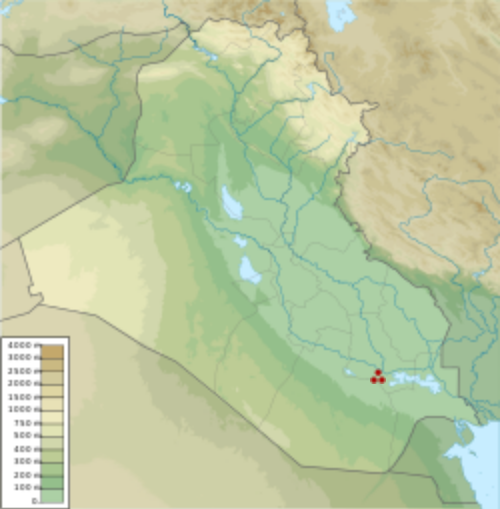KUARA
(SUMER)

Kuara,
Kisiga, Ku'ara shown within Iraq
Location
: Dhi
Qar Governorate, Iraq
Region
: Mesopotamia
Coordinates
:
30°50' N 46°20' E
Type
: tell
Site
notes :
Excavation
dates :
1855, 1918, 1940s
Archaeologists
:
J.E. Taylor, R. Campbell Thompson, F. Safar
Kuara
(also known as Kisiga, Ku'ara, modern Tell al-Lahm site, Dhi Qar
Governorate, Iraq) is an archaeological site in Dhi Qar Province
(Iraq). According to the Sumerian King List, Kuara was also the
home of Dumuzid, the fisherman, the legendary third king of Uruk.
The city's patron deity was Meslamtaea (Nergal). In Sumerian mythology,
Kuara was also considered the birthplace of the god Marduk (Asarluhi),
Enki's son. The cults of Marduk and Ninehama were centered in Kuara.
History
of archaeological research :
The location was excavated for a few days in 1855 by J. E. Taylor.
He found a few inscribed bricks, and a single cuneiform tablet.
While working at Eridu for the British Museum in 1918, R. Campbell
Thompson excavated there briefly. In more modern times, Fuad Safar
conducted soundings at Kuara.
Kuara
and its environment :
Tell al-Lahm is located on the western bank of the mouth of the
Euphrates, about 30 kilometres (19 mi) southeast of Ur. The site
consists of two tells or settlement mounds, with some peripheral
ridges, near a dry canal bed.
Occupation
history :
Kuara was established ca. 2500 BC, during the Sumerian Early Dynastic
II period. It was a seaport to the Persian Gulf, and traded with
the port of Dilmun. In 709 BC, the Assyrian king Sargon II was trying
to capture Marduk-apal-iddina II, who fled to Kuara, whereupon Sargon's
army laid siege and destroyed the city. Alluvial soil carried by
the Euphrates continually extended the land farther into the Persian
Gulf; thus the modern site is far from the sea, even though it was
a sea port 4500 years ago.
Source
:
https://en.wikipedia.org/
wiki/Kuara_(Sumer)

